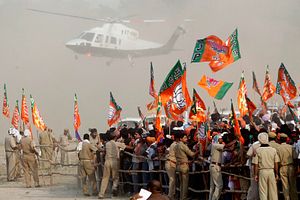The last Indian general election concluded on May 12, 2014. Initial predictions were for the National Democratic Alliance (NDA) – the Bharatiya Janata Party (BJP)-led coalition – to capture 220 out of 545 seats. In fact, the BJP alone won 282, while the NDA coalition combined won 336. The scale of the BJP’s victory – and certainly the possibility that the party could win an absolute majority on its own – was not predicted or anticipated by even the most seasoned observers of Indian politics. Almost two years later a number of questions persist: How do we explain the surprising results of the election? What does the election indicate about the broader Hindu nationalist movement and its success? And how has the party (and the movement) used its time in office thus far?
It is worth noting that because of India’s first-past-the-post electoral system, the BJP won 51.7 percent of seats in the Lok Sabha despite winning only 31 percent of the popular vote. Thus, one should not exaggerate the extent of this victory in terms of it signifying some sweeping political consensus. Many accounts of the election and its aftermath have suggested that the public broadly embraced the Hindu nationalist movement. It is more accurate to say that almost a third of the electorate selected the BJP’s campaign platform over the alternatives.
The BJP is the political party of the Hindu nationalist movement, which consists of about three dozen organizations that are united by a commitment to an ideology of Hindutva. This ideology is based on the assertion that India is the homeland of Hindus (broadly defined to also include Buddhists, Jains, and Sikhs). As the Hindu homeland, the state should serve as a champion of Hindus and their interests. The ideology papers over the many differences among Hindus, especially of caste and language, while emphasizing the separation between most Indians and their Muslim and Christian compatriots. These ideas are based on a fabricated historical narrative and poor sociology, but their aim is not to accurately describe India as much as to create new facts on the ground.

































